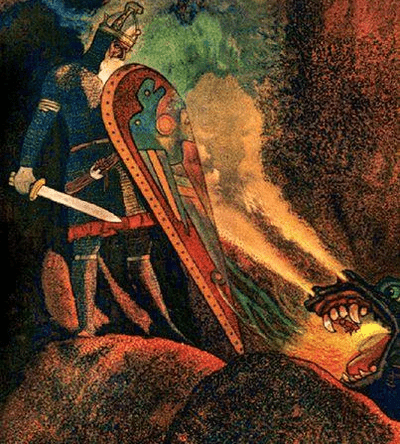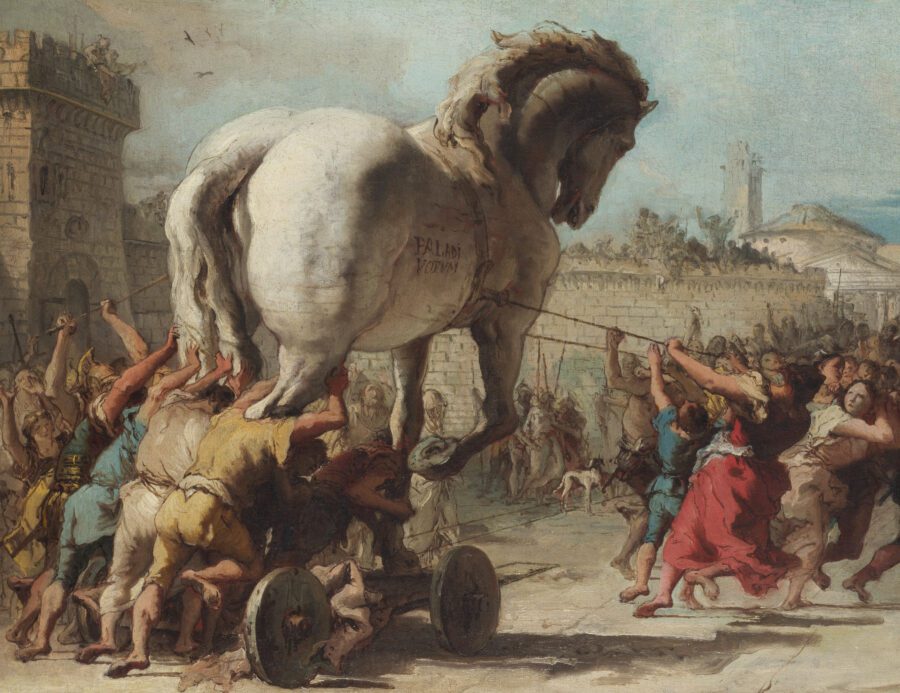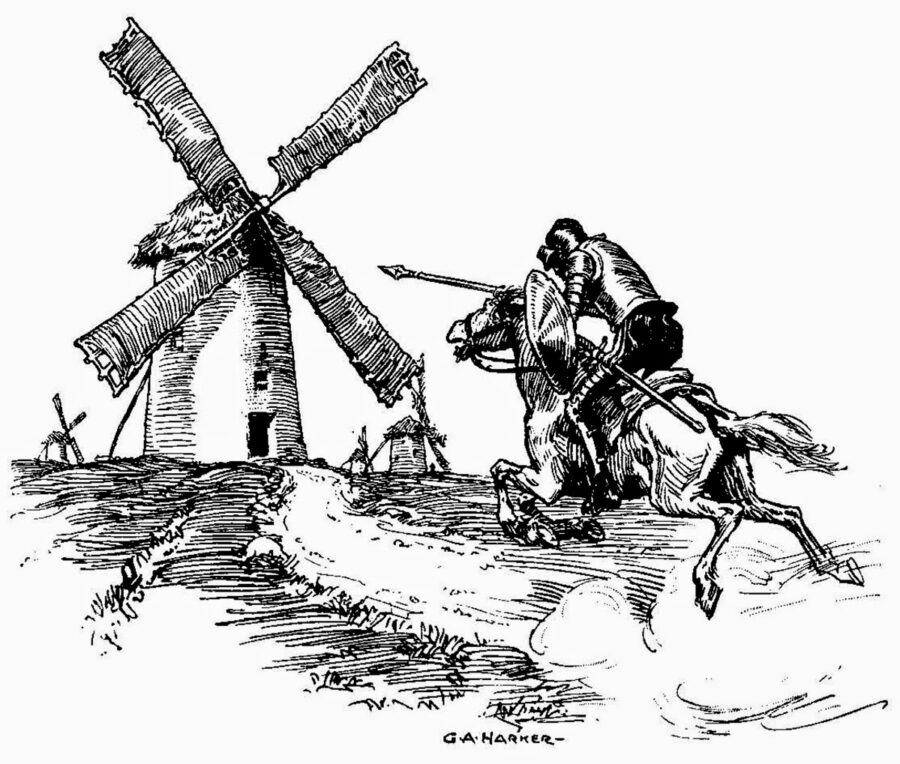Why read classic literature? Why is classic literature important? And how can literature help students and parents alike?
Classic literature is one of the major focuses of the Classical Conversations Challenge programs. From modern classics like The Lion, the Witch and the Wardrobe to ancient epics like The Aeneid, students will read the seminal works of Western literature through each year-long program.
However, our culture no longer values classic literature. Public schools are removing classic books from the curriculum and replacing them with contemporary books and “student choice.” Meanwhile, institutions of higher education across the West are downsizing humanities departments, as fewer students are pursuing degrees in subjects like English, classical studies, and philosophy. And classic literature is even dismissed by some as simply “unimportant.”
Ouch.
But I don’t agree with that assessment. Classic literature offers real value to readers. Here’s why.
Why Read Classic Literature: The Three Es
I apologize in advance to anyone allergic to alliteration.
There are three main reasons to read anything, classic literature or otherwise: for entertainment, education, and edification.
The classics elevate these reasons. They enchant our imagination, exercise our minds, and enlighten our souls. They’ve risen to eminence because they speak with eloquence and erudition. And, above all, they enshrine the cumulative experience of civilization.
Let’s look at those first three Es of reading in more detail, starting with entertainment.
1. You Should Read the Classics for Entertainment
Then from the moor under the misty cliffs came Grendel, he bore God’s anger. The foul foe purposed to trap with cunning one of the men in the high hall; he went under the clouds till he might see most clearly the wine-building, the gold-hall of warriors, gleaming with plates of gold. That was not the first time he had sought Hrothgar’s home; never in his life-days before or since did he find bolder heroes and hall-thanes. The creature came, bereft of joys, making his way to the building. Straightway the door, firm clasped by fire-hardened fetters, opened, when he touched it with his hands; then, pondering evil, he tore open the entry of the hall when he was enraged . . .”
– Excerpt from Beowulf
Beowulf is important for many reasons. Composed sometime during the early medieval period, this epic poem offers us important insights into Anglo-Saxon culture, the transformation of England from paganism to Christianity, and the development of the English language . . .
Yawn! That’s not why Beowulf is considered a classic. Beowulf is a classic because it’s exhilarating. (Hey, there’s another e of reading.) The poem has entertained generation after generation of readers. Students in every century have been thrilled by Beowulf’s battles against grudge-bearing Grendel, Grendel’s monstrous mother, and the death-dealing dragon.

Additionally, classics are considered masterpieces because of their artistry. The beauty of poetic verses, the intricacy of prose, or the depth of a tragic plot are sources of deep aesthetic pleasure. Also, we derive much of our entertainment from the thrill of a good challenge. Think about it: we play sports, music, video games, and so on for the sheer joy of overcoming the challenge. Why shouldn’t we read classics for the same reason? Challenging texts are fulfilling. The sense of accomplishment after finishing a tough classic is a reward in itself.
Our culture distinguishes between “classic literature” and “popular entertainment,” but in truth, classic literature is popular entertainment, elevated by a devotion to truth, beauty, and goodness. Shakespeare is one of the clearest examples of classic literature as an elevated form of entertainment; his first publication, a narrative poem called Venus and Adonis, was a bestseller, and his plays were packed with large and rowdy audiences.1“How Did Shakespeare Get so Popular?” Shakespeare Birthplace Trust, Accessed October 10, 2022. https://www.shakespeare.org.uk/explore-shakespeare/podcasts/lets-talk-shakespeare/how-did-shakespeare-get-so-popular/ And while modern theater audiences are less rowdy, Shakespeare’s plays continue to draw crowds.
Why was Shakespeare popular then? Because his works were entertaining! Why is Shakespeare popular now? Because his works are still entertaining!
Of course, classic literature is often difficult to understand, but one of the primary purposes of a classical education is to equip your student with the essential grammar needed to enjoy the classics. Beowulf will enthrall your student once your student groks the kennings of this epic poem. Shakespeare will enrapture your student once your student grasps the language of his works.
And once your student has fun reading the classics, your student will want to read more.
2. You Should Read the Classics for Education
Classic literature is education by osmosis.
Classic Literature Promotes Eloquence
In The Elements of Eloquence, Mark Forsyth makes a bold claim: “Shakespeare was not a genius.” Come again? “He was, without the distant shadow of a doubt, the most wonderful writer who ever breathed. But not a genius. No angels handed him his lines, no fairies proofread for him. Instead, he learnt techniques, he learnt tricks, and he learnt them well.”2Mark Forsyth, The Elements of Eloquence: Secrets of the Perfect Turn of Phrase (New York: Penguin Books, 2014)
Shakespeare developed his writing talent by reading talent. Those well-learned tricks and techniques? They came from familiarity with the classics. Take this line from Macbeth: “Will all great Neptune’s ocean wash this blood/Clean from my hand?/No, this my hand will rather/The multitudinous seas incarnadine,/Making the green one red.”
Shakespeare may or may not have been familiar with the name of this literary technique—adynaton, a kind of impossible hyperbole—but he was undoubtedly familiar with the idea; Jesus uses this technique in the Gospel of Matthew, saying, “It is easier for a camel to go through the eye of a needle, than for a rich man to enter into the kingdom of God”!
Classic Literature Promotes Language Skills
Classic literature expands our vocabulary and exposes us to eloquent expressions of language. The richness and depth of classical prose and poetry enhances the student’s appreciation for linguistic beauty.
Additionally, the dense and often complex narratives of Great Book require readers to think, and to make connections and interpret subtext. This can sharpen analytical and comprehension skills.
Furthermore, reading skills precede writing skills. There’s no shortcut to developing first-rate writing skills; thus, if you want your student to write well, your student must first read well. Also, many literary techniques, tropes, and archetypes originate from classic literature, and a reader of the classics can put these to use in their own writings.
Classic Literature Promotes Cultural Literacy
Literature also helps us navigate our culture.
The language of literature informs our daily language, the ideas of literature inform our ideas, and the structure of literature even structures our thoughts.
Classics are products of their time and place, yet they are timeless. America is not ancient Greece, yet the Iliad persists as threads through our cultural fabric. Words like Achilles’ heel and Trojan horse pervade our language, and wrathful Achilles, cunning Odysseus, and beautiful Helen endure as archetypal figures in our common imagination. So, whether you’ve read Homer’s epic poem or not, the Iliad is part of you by virtue of our shared tradition. Many contemporary books, movies, and other forms of media draw upon themes, plots, and characters from classic literature. Understanding the originals provides a richer experience when encountering modern adaptations or references.
If you want your student to understand our culture, your student must first understand the classics.

3.You Should Read the Classics for Edification
According to critic Harold Bloom, “Ultimately we read . . . to strengthen the self, and to learn its authentic interests.” 3Harold Bloom, How to Read and Why (New York: Simon & Schuster, 2001)
The Maturity of Classic Literature
Edification, or the building of one’s soul, can come from anywhere—from the words of a friend or the many slings and arrows of life—but classics in particular speak with the wisdom of “maturity,” as TS Eliot puts it.4S. Eliot, “What Is a Classic?” Address presented at the Virgil Society, October 16, 1944. Classics withstand time’s weathering winds because they offer us the kind of advice, comfort, and encouragement only mature minds nurtured by mature civilizations can give.
Furthermore, the classics address moral dilemmas, challenging students to consider their own values and beliefs. These works can act as mirrors, helping us to reflect upon and understand ourselves better.
In the end, we are the company we keep. Time wasted in shallow company yields a shallow mind, while time spent in mature company produces a mature mind. Classic literature offers students the chance to spend time in the mature company of some of Western civilization’s greatest minds.
The Timeless Themes of Classic Literature
Classic literature approaches universal themes – love, betrayal, ambition, identity, morality, and existential dilemmas, among others. These topics connect students with the human experience throughout time. Classic literature provides windows into different eras, cultures, and ways of thinking, allowing students to walk in the shoes of characters from distant times and places. Engaging with characters and situations from classic literature can foster empathy by allowing students to understand and feel for people who may be different from themselves.
There’s a profound experience in reading words written hundreds or even thousands of years ago, realizing that those authors, despite the vast chasm of time, shared emotions, thoughts, and experiences similar to our own.

Why Read Classic Literature: The Great Conversation
Why study classic literature?
The classics exist in relation to each other. The classics are stones stacked high upon other stones, each one contributing to the tower of the Western canon. The classics add to an ongoing dialogue, each new generation responding to the previous generation. Our culture—indeed, our civilization—is a product of this Great Conversation.5Robert Maynard Hutchins, The Great Conversation: The Substance of a Liberal Education, (Chicago: Encyclopædia Britannica, 1990)
Classics have shaped the cultural, social, and political landscapes of societies for generations. By reading them, the student gains insights into the cultural and historical contexts that have influenced today’s world. The student enters into the Great Conversation, first as a listener and then as a participant.
That’s a wonderful gift for any student.
Classic literature offers a treasure trove of knowledge, wisdom, and beauty, bridging the past and the present, and allowing readers to engage in timeless conversations about the intricacies of the human experience. Whether you’re looking for entertainment, education, or edification, the classics have something to offer.




